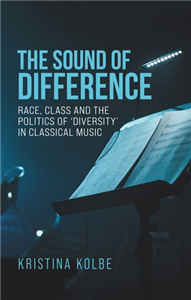The sound of difference
Race, class and the politics of 'diversity' in classical music
by Kristina Kolbe
Description
More Information
Rights Information
Albania, Algeria, Angola, Argentina, Armenia, Australia, Austria, Bahrain, Belgium, Belize, Benin, Bolivia, Bosnia and Herzegovina, Botswana, Brazil, Bulgaria, Burkina Faso, Burundi, Cameroon, Canada, Cape Verde, Central African Republic, Chad, Chile, China, Colombia, Comoros, Congo [DRC], Congo, Republic of the, Costa Rica, Ivory Coast, Croatia, Czech Republic, Denmark, Djibouti, Ecuador, Egypt, El Salvador, Equatorial Guinea, Eritrea, Estonia, Ethiopia, Faroe Islands, Finland, France, French Guiana, Gabon, Gambia, Georgia, Germany, Ghana, Greece, Guatemala, Guinea, Guinea-Bissau, Guyana, Honduras, Hongkong, Hungary, Iceland, India, Indonesia, Iran, Iraq, Ireland, Israel, Italy, Japan, Jordan, Kazakhstan, Kenya, Kuwait, Latvia, Lebanon, Lesotho, Liberia, Libya, Lithuania, Luxembourg, Macau, China, Macedonia [FYROM], Madagascar, Malawi, Malaysia, Mali, Malta, Mauritania, Mauritius, Mayotte, Mexico, Mongolia, Montenegro, Morocco, Mozambique, Namibia, Netherlands, New Zealand, Nicaragua, Niger, Nigeria, Norway, Oman, Pakistan, Panama, Paraguay, Peru, Philippines, Poland, Portugal, Puerto Rico, Qatar, Reunion, Romania, Russia, Rwanda, Saint Helena, Sao Tome and Principe, Saudi Arabia, Senegal, Serbia, Seychelles, Sierra Leone, Singapore, Slovakia, Slovenia, Somalia, South Africa, South Korea, Spain, Sri Lanka, Sudan, Suriname, Swaziland, Sweden, Switzerland, Syria, Taiwan, Tanzania, Thailand, Timor-Leste, Togo, Tokelau, Tunisia, Turkey, Uganda, Ukraine, United Arab Emirates, United Kingdom, United States, Uruguay, Venezuela, Vietnam, Western Sahara, Yemen, Zambia, Zimbabwe, South Sudan, Cyprus, Palestine, Bangladesh, Cambodia, Liechtenstein, Azerbaijan, Jamaica, Kyrgyzstan, Dominican Republic, Myanmar, Monaco
Reviews
What happens when the elitist space of 'Western' classical music seeks to diversify itself? And what are the social effects worked through diversity discourses in classical music institutions? Sounding difference addresses these timely concerns by critically examining how diversity work takes shape in a cultural sector so deeply implicated in hierarchies of class, structures of whiteness, and legacies of imperialism. Against persistent social exclusions in the sector, and sharpening inequality and upsurging ethnonationalism in Europe, the book draws from ethnographic and interview data to analyse how diversity discourses become constructed in the organisational and creative processes of music production. From rehearsal and performance practices to the impact of the Covid-19 pandemic on the sector's commitment to change, Kolbe reveals the institutional constraints and precarious labour relations that form around diversity work in classical music and skilfully considers what these processes can tell us about the remaking of class, race, and racism today. Overall, Sounding difference makes visible the contingent ways in which diversity discourses in the cultural industries contribute to the endurance of white middle-class social domination, yet also draws out under which conditions they may unlock a more radical cultural politics predicated on creative and social justice.
Author Biography
Kristina Kolbe is Assistant Professor in Sociology of Arts and Culture at Erasmus University Rotterdam
Manchester University Press
Manchester University Press is a leading UK publisher known for excellent research in the humanities and social sciences.
View all titlesBibliographic Information
- Publisher Manchester University Press
- Publication Date June 2024
- Orginal LanguageEnglish
- ISBN/Identifier 9781526165497 / 152616549X
- Publication Country or regionUnited Kingdom
- FormatPrint PDF
- Pages272
- ReadershipGeneral/trade; College/higher education; Professional and scholarly
- Publish StatusPublished
- Dimensions216 X 138 mm
- Biblio NotesDerived from Proprietary 5629
- SeriesMusic and Society
- Reference Code14769





